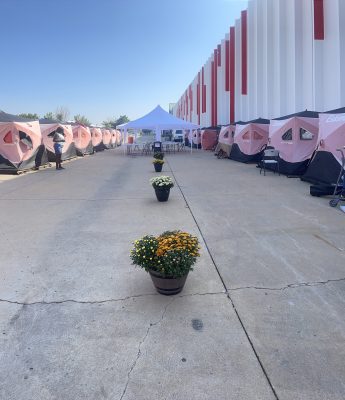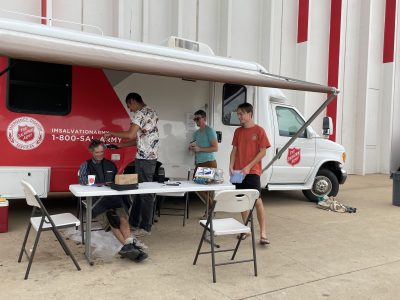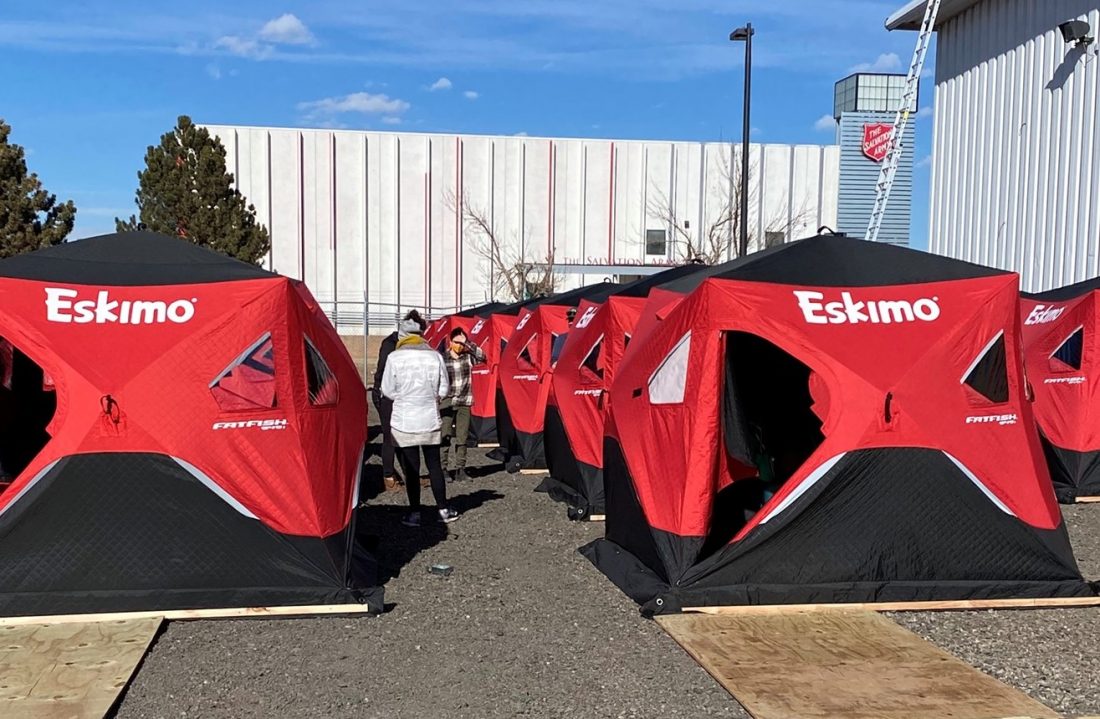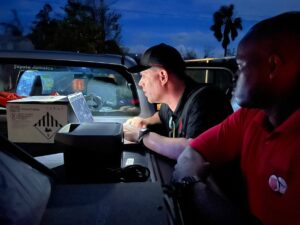Salvation Army hosts outdoor shelter program for those experiencing homelessness
While The Salvation Army has provided rapid rehousing and homeless prevention services in Aurora for a few years, a brand-new program is providing people with a safe place to sleep, warm meals and medical services, in addition to helping find permanent housing. Safe Outdoor Spaces opened in the middle of the summer and has been full nearly every night since.
“Homelessness across Denver Metro has been on the rise for several years, but most services are located in Denver,” said Major Richard Pease, Divisional Secretary for Business and Denver Metro Coordinator for The Salvation Army. “This is our first organized effort outside the City and County of Denver to provide shelter and case management.”
The city estimates there are about 150 available shelter beds for the over 400 known individuals experiencing homelessness, making these spaces crucial for working to secure permanent and stable housing.
The city of Aurora approached The Salvation Army with the idea and, after submitting an application and proposal, the Safe Outdoor Spaces opened July 1, 2021, with 20 all-weather fishing tents in the parking lot of The Salvation Army Emergency Services Warehouse.

“It’s really exciting we can jump in and support in this way,” said Denver Metro Social Services Director Kristen Baluyot.
The Salvation Army committed to using nearly $250,000 of its federal CARES grant funds to run the pilot program, initially set to end at the end of September.
“It went beautifully, even better than we had hoped we would see,” Baluyot said.
The program was extended through May 2022 and Baluyot is putting together a proposal to request ARPA (American Rescue Plan Act) funds to continue the program.
Most nights, Safe Outdoor Spaces serves more than 27 people, with a high of 33 on some nights, she said. Sixty-five percent of those served have been men.
“We had to do a lot of pre-outreach to find people to come initially, but after being open for two weeks, we have been full pretty much every day since as a result of the work being done,” she said.
The program is much more than a bed in a tent. Two on-site case managers provide housing-focused case management and residents have access to a variety of 24-hour services.
“The case managers’ first objective is to assess people and then get them into the one home coordinated entry system, so they’re eligible for various housing resources, rapid rehousing or even housing vouchers that have come online due to COVID,” Baluyot said. “Then we work on identifying what their needs are and what we can do to remove barriers to housing, like getting people employed.”
The Salvation Army also partners with key agencies, like STRIDE Community Healthcare Center, which provides access to a nearby clinic as well as doctors and nurses who triage people on site. Providers from Aurora Mental Health provide on-site mental and behavioral services and case management. Aurora Warms the Night provides a shower truck, ensuring people can bathe. The Salvation Army provides three meals a day prepared by The Salvation Army Harbor Light facility, as well as a community tent where people can hang out and play games.

As of the end of August, which was the latest data available at the time of the interview, two people had secured permanent housing; seven people rejoined family members in permanent housing; three people secured jobs; six people had gotten IDs, and; one person had gotten a Social Security card.
A client named Rey is one such success story. He worked closely with one of the case managers to find a job, housing and benefits. Rey listed his case manager and another assistant at Safe Outdoor Spaces as job references and now works at a coffee shop, Baluyot said, though his long-term goal is to work in homelessness services helping others who are facing what he went through. Even though he’s not living at Safe Outdoor Spaces anymore, his caseworker is helping him transition into the field.
In anticipation of housing at the warehouse lot indefinitely, the city is funding infrastructure upgrades, like running electricity, laying concrete and adding more permanent fencing and privacy screens.
As temperatures drop, the fishing tents will be replaced with pallet shelters, which is the first pallet shelter community in the Denver-Metro Area, Baluyot believes. The shelters, which are designed to be collapsed/moved repeatedly and still last a decade, will include built-in desks and beds. Some of the shelters will have air conditioners and heating units inside.
The better the environment is for someone, the more it uplifts them and reinforces their worth.
“Our goal is that people will leave and go to permanent stable housing, but it provides a dignified space for people to get their bearings and to remember they have worth and dignity,” Baluyot said. “Once people remember that, they tend to strive toward that permanent outcome.”
Do Good:
- See how The Salvation Army fights homelessness.
- How do we treat everyone with love and kindness, as if they were our neighbor? Get the Do Good Family Roadmap and take a 4-week journey for families in how to be a good neighbor. Follow the guide to see what the Bible says about the art of neighboring and take tangible steps together on your printable roadmap to be a caring, helpful, welcoming and supportive neighbor right where you are.
- You’ve probably seen the red kettles and thrift stores, and while we’re rightfully well known for both…The Salvation Army is so much more than red kettles and thrift stores. So who are we? What do we do? Where? Right this way for Salvation Army 101.












